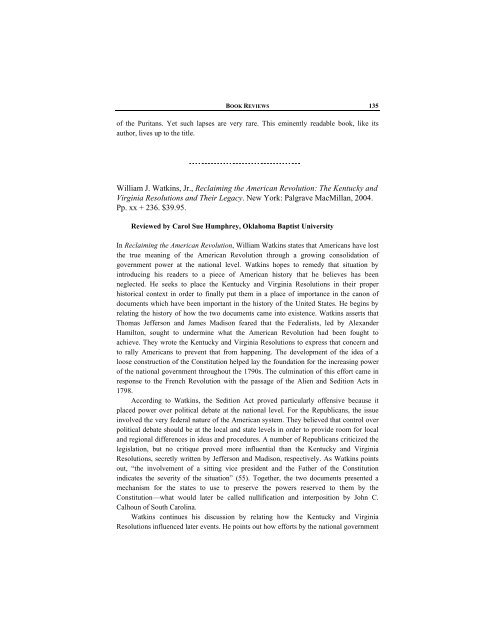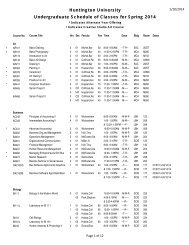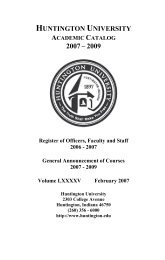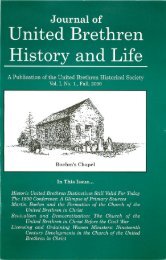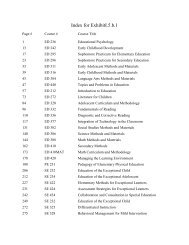Gillian Clark, Christianity and Roman Society - Huntington University
Gillian Clark, Christianity and Roman Society - Huntington University
Gillian Clark, Christianity and Roman Society - Huntington University
Create successful ePaper yourself
Turn your PDF publications into a flip-book with our unique Google optimized e-Paper software.
BOOK REVIEWS 135<br />
of the Puritans. Yet such lapses are very rare. This eminently readable book, like its<br />
author, lives up to the title.<br />
William J. Watkins, Jr., Reclaiming the American Revolution: The Kentucky <strong>and</strong><br />
Virginia Resolutions <strong>and</strong> Their Legacy. New York: Palgrave MacMillan, 2004.<br />
Pp. xx + 236. $39.95.<br />
Reviewed by Carol Sue Humphrey, Oklahoma Baptist <strong>University</strong><br />
In Reclaiming the American Revolution, William Watkins states that Americans have lost<br />
the true meaning of the American Revolution through a growing consolidation of<br />
government power at the national level. Watkins hopes to remedy that situation by<br />
introducing his readers to a piece of American history that he believes has been<br />
neglected. He seeks to place the Kentucky <strong>and</strong> Virginia Resolutions in their proper<br />
historical context in order to finally put them in a place of importance in the canon of<br />
documents which have been important in the history of the United States. He begins by<br />
relating the history of how the two documents came into existence. Watkins asserts that<br />
Thomas Jefferson <strong>and</strong> James Madison feared that the Federalists, led by Alex<strong>and</strong>er<br />
Hamilton, sought to undermine what the American Revolution had been fought to<br />
achieve. They wrote the Kentucky <strong>and</strong> Virginia Resolutions to express that concern <strong>and</strong><br />
to rally Americans to prevent that from happening. The development of the idea of a<br />
loose construction of the Constitution helped lay the foundation for the increasing power<br />
of the national government throughout the 1790s. The culmination of this effort came in<br />
response to the French Revolution with the passage of the Alien <strong>and</strong> Sedition Acts in<br />
1798.<br />
According to Watkins, the Sedition Act proved particularly offensive because it<br />
placed power over political debate at the national level. For the Republicans, the issue<br />
involved the very federal nature of the American system. They believed that control over<br />
political debate should be at the local <strong>and</strong> state levels in order to provide room for local<br />
<strong>and</strong> regional differences in ideas <strong>and</strong> procedures. A number of Republicans criticized the<br />
legislation, but no critique proved more influential than the Kentucky <strong>and</strong> Virginia<br />
Resolutions, secretly written by Jefferson <strong>and</strong> Madison, respectively. As Watkins points<br />
out, “the involvement of a sitting vice president <strong>and</strong> the Father of the Constitution<br />
indicates the severity of the situation” (55). Together, the two documents presented a<br />
mechanism for the states to use to preserve the powers reserved to them by the<br />
Constitution—what would later be called nullification <strong>and</strong> interposition by John C.<br />
Calhoun of South Carolina.<br />
Watkins continues his discussion by relating how the Kentucky <strong>and</strong> Virginia<br />
Resolutions influenced later events. He points out how efforts by the national government


